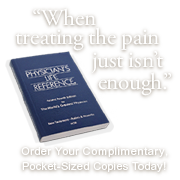Orthopaedic Soft Goods
Orthopedic Physicians, Physical Therapists, and Family Practice Physicians often recommend orthopaedic soft goods and associated supportive devices as a cost-effective alternative treatment to their patients with minor sprains and injuries, those undergoing physical therapy, or as a post-op therapeutic solution. These soft goods include high-quality orthopaedic braces, splints, walkers, supports and other non-invasive orthotic rehabilitation devices. Implementing the use of orthopaedic soft goods serves to immobilize and protect the injured anatomy during the healing process, prevents future injuries, and may substantially improve the quality of a patient's life.
Lower Body
Physicians prefer to use cost effective orthopedic soft goods and lower body supportive devices when treating injuries and disabilities of the back, knees, ankles, and feet.
Upper Body
Physicians prefer to use cost effective orthopedic soft goods and upper body supportive devices when treating injuries and disabilities of the hands, arms, elbows, shoulders, and neck.
 Top
Top



